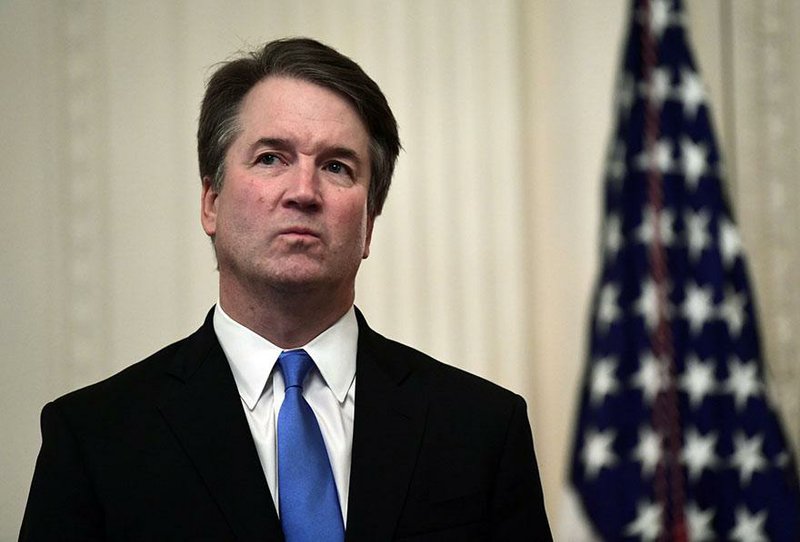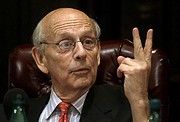WASHINGTON -- The Supreme Court heard more than three hours of arguments Tuesday on the powers of the presidency and whether they protect President Donald Trump from the prosecutors and House committees seeking to obtain troves of information about his business affairs.
The court considered two cases.
Trump has argued, in response to a subpoena from the Manhattan, N.Y., district attorney, that he was immune from criminal investigation while he remained in office. He also has made the argument that the House committees had asked for too much information for reasons unrelated to their legislative responsibilities.
Should the court order the release of the president's tax returns and other financial information in response to the House subpoenas, the records would almost certainly be made public.
But if the Manhattan prosecutors prevail in their arguments, then the records would not immediately be made public under the secrecy rules that apply to grand juries.
The Supreme Court, which includes six justices age 65 or older, has been meeting by phone because of the coronavirus pandemic.
The justices asked their questions one at a time, in order of seniority.
The court's ruling is expected by July.
Some of the justices' questions raised the possibility that the court could return the cases to lower courts for reconsideration under stricter standards. That would have the incidental effect of deferring a final decision beyond the 2020 presidential election.
Michael C. Dorf, a law professor at Cornell, said the two cases could have different outcomes.
"The congressional cases appeared to split the justices on ideological lines, with the possible exception of Justice [Stephen] Breyer, who seemed genuinely concerned about excesses against future presidents," Dorf said, referring to Justice Stephen Breyer.
"There appeared to be more cross-ideological agreement in the New York grand jury case," he said, noting justices seemed skeptical of Trump's argument.
Breyer said that he was concerned about the presidency rather than a particular president, recalling Sen. Joseph McCarthy's investigations of supposed communist infiltration of the government in the 1950s.
"What I hold today will also apply to a future Sen. McCarthy asking a future Franklin Roosevelt or Harry Truman," Breyer said.
There was no doubt that the questions before the court were momentous and consequential -- for Trump, for the justices, for the separation of powers among the three branches of the federal government and for the relationship between local officials and the president.
LOOKING AT PRECEDENT
"The subpoenas here are unprecedented in every sense," said Patrick Strawbridge, the lawyer representing Trump in the case on inquiries from Congress, Trump v. Mazars USA, No. 19-715, which the court heard first.
Several justices disputed that, saying the Watergate investigation of former President Richard Nixon and the Whitewater investigation of former President Bill Clinton provided apt analogies. Both presidents lost unanimous Supreme Court cases in which they sought to withhold information.
"History and practice matter quite a bit in separation-of-powers cases," Justice Brett Kavanaugh said.
The justices returned repeatedly to those precedents: United States v. Nixon in 1974 and Clinton v. Jones in 1997.
In the Nixon case, the Supreme Court unanimously ruled that he had to comply with a trial subpoena seeking tapes of his conversations in the Oval Office, rejecting claims of executive privilege. In the Clinton case, the court unanimously allowed a sexual harassment suit against the president to proceed, discounting concerns that it would distract him from his official responsibilities.
Several justices said those two cases posed problems for Trump's position in the second case, Trump v. Vance, No. 19-635, resulting from the Manhattan district attorney's request for business records in a criminal inquiry. If Nixon was required to turn over information about his official conduct in a criminal case, they said, why should Trump be able to shield records of his private conduct?
"As far as the impact of the president is concerned, I think there's no case more dramatic than the Nixon tapes' devastating impact on the president," Justice Ruth Bader Ginsburg said. "He resigned from office. But yet that was OK. So I really don't get it."
And if Clinton was required to provide a deposition in the sexual harassment case, several justices asked, why should Trump be able to avoid the lesser burden of allowing third parties to provide information to prosecutors?
"How do we avoid the conclusion there," Justice Neil Gorsuch asked, referring to the Clinton case, "that the president wasn't subject to some special immunity but here is?"
"There," said Gorsuch, who was appointed by Trump, "they sought the deposition of the president while he was serving. Here, they're seeking records from third parties."
The first case, concerning subpoenas from the House committees, did not feature such precedents, and the justices' questions concerning them mostly reflected their usual inclinations. The more liberal members of the court for the most part expressed skepticism of Trump's arguments, and the more conservative ones said they were worried about opening the door to partisan harassment of the president.
Chief Justice John Roberts suggested that the case was in one sense routine. "It sounds like at the end of the day," he said, "this is just another case in which the courts are balancing the competing interests."
Breyer, a member of the court's liberal wing, expressed dismay at breadth and the burdens the House subpoenas imposed.
"They apply to 15 Trump-affiliated entities," he said of the subpoenas. "They ask for all documents related to opening of accounts, due diligence, closing, requests for information by other parties, et cetera. Now that's a lot of information, and some of it's pretty vague."
Justice Sonia Sotomayor said congressional inquiries into foreign influence over U.S. elections were undoubtedly proper. But she and Kavanaugh indicated that a hypothetical subpoena for the president's medical records would be out of bounds.
Justice Elena Kagan displayed some agreement with both sides. On the one hand, she suggested the president's lawyers were asking for too much.
"What it seems to me you're asking us to do is to put a kind of 10-ton weight on the scales between the president and Congress and essentially to make it impossible for Congress to perform oversight and to carry out its functions where the president is concerned," Kagan, one of the court's liberal justices, said.
Douglas Letter, the general counsel of the House of Representatives, said the president's arguments were surprising in their boldness. "History really matters here," he said, "and it shows that the arguments being made here by President Trump astonishingly ask you to ignore a massive amount of history."
The sheer number and breadth of the congressional subpoenas, Justice Clarence Thomas said Tuesday, was problematic. "At some point," he said, "this thing gets out of control."
Later in the argument, he elaborated. "There's a straw that breaks the camel's back," he told Letter, "and it seems as though you're saying that we should look at these in isolation as opposed to in the aggregate. Why wouldn't we look at all of them and look at the full effect and whether at some point it debilitates the president?"
"In your view, there is really no protection against the use of congressional subpoenas for the purpose of preventing the harassment of a president," Justice Samuel Alito said to Letter.
QUESTIONS OF IMMUNITY
The second argument began immediately after the first. It concerned a subpoena to Trump's accounting firm from the office of the Manhattan district attorney -- Cyrus Vance Jr., a Democrat -- seeking eight years of business and personal tax records in connection with an investigation of the role that Trump and the Trump Organization played in hush-money payments made in the run-up to the 2016 election.
Both Trump and his company reimbursed the president's former lawyer and fixer, Michael Cohen, for payments made to the pornographic film actress Stormy Daniels, who said that she had an affair with Trump.
Cohen was also involved in payments to Karen McDougal, a Playboy model who had also said she had a relationship with Trump. The president has denied the relationships.
Jay Sekulow, a lawyer for Trump, said his client was entitled to "temporary presidential immunity" from the subpoena while he remains in office.
Trump had said he would make his tax returns public when audits were completed, but he hasn't done so.
Courts have long recognized that "the president is not to be treated as an ordinary citizen," Sekulow said. "He has responsibilities. He is himself a branch of government. He is the only individual that is a branch of government in our federal system."
That prompted a follow-up from Kagan: "But it's also true and, indeed, a fundamental precept of our constitutional order that a president isn't above the law."
Solicitor General Noel Francisco took a more nuanced position in his defense of Trump.
Because the president is not an ordinary citizen while in office, prosecutors must demonstrate a "heightened showing of need" to subpoena the president's private records, Francisco said.
Information for this article was contributed by Adam Liptak of The New York Times; by Robert Barnes, Ann E. Marimow, Jonathan O'Connell, David A. Fahrenthold and Felicia Sonmez of The Washington Post; and by Mark Sherman and Kevin Freking of The Associated Press.
A Section on 05/13/2020


